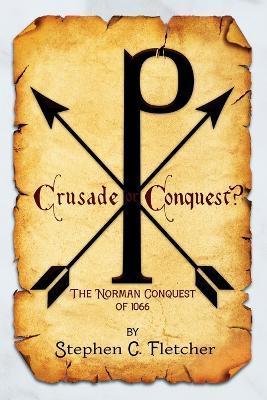Crusade or Conquest? The Norman Conquest of 1066

Crusade or Conquest? The Norman Conquest of 1066
The 11th-century Norman Conquest of England was the last in a steady stream of invasions that spanned 1,000 years-including Caesar's attempt around 54 BC and Claudius' more successful campaign in AD 43. This was followed, beginning in the 5th century, by Angles, Saxons, and Jutes, Vikings in the 9th century, and William the Bastard in 1066.The chroniclers upon whom we must rely give several reasons, or excuses, to justify the Norman invasion, including Orderic Vitalis' claim that it was prompted by Rome's pontiff in order to "reform the English church."
Fletcher points out that this same chronicler quotes William, stating Normans were untrustworthy, "bringing ruin upon themselves...they are eager for rebellion, ripe for tumults, and ready for any sort of crime." William of Malmesbury adds, "They are envied by their equals and sought to rival their superiors. They plunder their subjects though defend them against others. They weigh treachery by its chance of success."
Are we then to believe these despoilers were acting at the behest of the pope and not out of self-interest? Wulfstan and Bede's habit of blaming the nation's ills on its people, its kings, and Church immorality paralleled that found in History of the Franks by Gregory bishop of Tours. La Manche (The Channel) may have separated Normandy from England physically, while England's Benedictine revival and its missionary exports to the Continent may have set it on a higher moral ground than Normandy. In this, Fletcher's second text, he unequivocally refutes Orderic's claim by comparing Church evolution north and south of The Channel.
PRP: 85.64 Lei
Acesta este Pretul Recomandat de Producator. Pretul de vanzare al produsului este afisat mai jos.
77.08Lei
77.08Lei
85.64 LeiLivrare in 2-4 saptamani
Descrierea produsului
The 11th-century Norman Conquest of England was the last in a steady stream of invasions that spanned 1,000 years-including Caesar's attempt around 54 BC and Claudius' more successful campaign in AD 43. This was followed, beginning in the 5th century, by Angles, Saxons, and Jutes, Vikings in the 9th century, and William the Bastard in 1066.The chroniclers upon whom we must rely give several reasons, or excuses, to justify the Norman invasion, including Orderic Vitalis' claim that it was prompted by Rome's pontiff in order to "reform the English church."
Fletcher points out that this same chronicler quotes William, stating Normans were untrustworthy, "bringing ruin upon themselves...they are eager for rebellion, ripe for tumults, and ready for any sort of crime." William of Malmesbury adds, "They are envied by their equals and sought to rival their superiors. They plunder their subjects though defend them against others. They weigh treachery by its chance of success."
Are we then to believe these despoilers were acting at the behest of the pope and not out of self-interest? Wulfstan and Bede's habit of blaming the nation's ills on its people, its kings, and Church immorality paralleled that found in History of the Franks by Gregory bishop of Tours. La Manche (The Channel) may have separated Normandy from England physically, while England's Benedictine revival and its missionary exports to the Continent may have set it on a higher moral ground than Normandy. In this, Fletcher's second text, he unequivocally refutes Orderic's claim by comparing Church evolution north and south of The Channel.
Detaliile produsului








